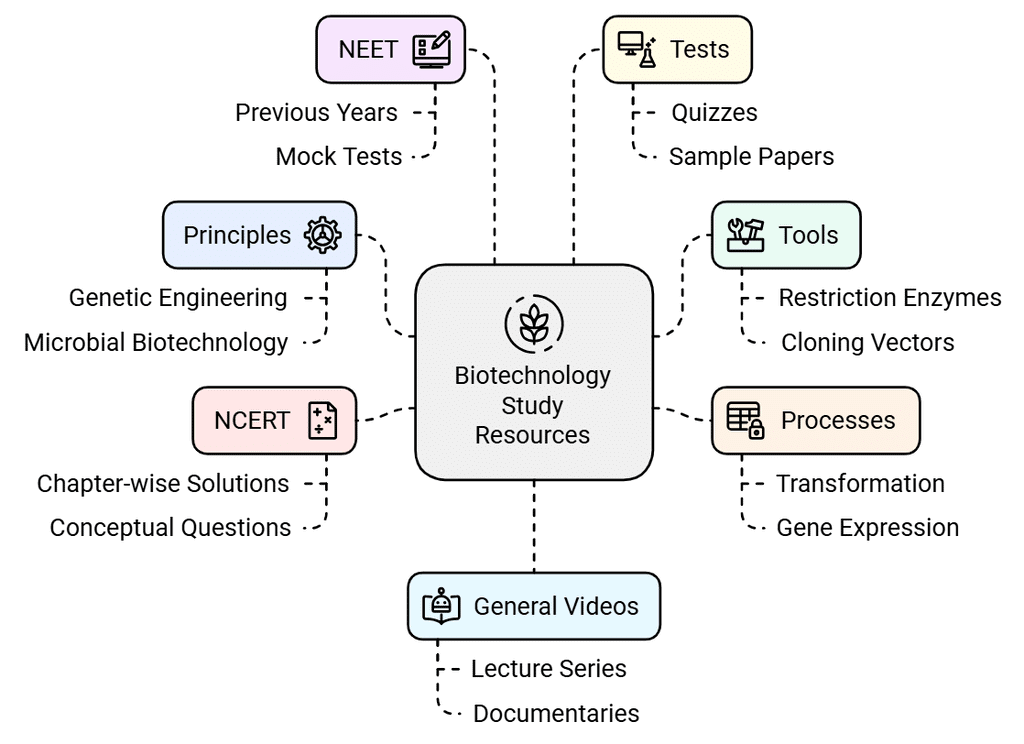NEET Exam > NEET Notes > Biology Class 12 > Index: Biotechnology: Principle & Processes
Index: Biotechnology: Principle & Processes | Biology Class 12 - NEET PDF Download

1. Principles of Biotechnology
- Video: Why Genetic Engineering
- Video: Steps of Genetic Engineering
- Video: Restriction Enzymes (Recognition Sequence)
- Doc: Principles of Biotechnology: Genetic Engineering
- Doc: Gene Transfer
2. Tools of Recombinant DNA technology
- Doc: Tools of Recombinant DNA Technology: Restriction Enzymes
- Doc: Tools of Recombinant DNA Technology: Cloning Vectors
- Doc: Competent Host
- Doc: DNA Finger Printing, DNA Test & Cloning
- Test: Tools of Recombinant DNA Technology: Cloning Vectors
- Test: Tools of Recombinant DNA Technology: Competent Host
- Test: Tools of Recombinant DNA Technology
3. Processes of Recombinant DNA technology
- Video: Isolation of the Genetic Material
- Video: Naming of Restriction Endonucleases
- Video: Working of Restriction Endonucleases
- Video: Foreign Gene Product & Downstream Processing
- Video: Foreign Gene Product & Downstream Processing
- Video: What is rDNA Technology
- Doc: Processes of Recombinant DNA Technology
- Test: Recombinant DNA Technology
- Test: Processes of Recombinant DNA Technology

4. NCERT textbook and solutions
- Doc: NCERT Textbook: Biotechnology: Principles & Processes
- Doc: NCERT Solutions: Biotechnology: Principles & Processes
5. NEET previous years
- Doc: NEET Previous Year Questions (2016-21): Biotechnology - Principles and Processes
- Test: 31 Years NEET Previous Year Questions: Biotechnology- Principles And Processes
6. Tests
- Test: Biotechnology : Principles and Processes- Assertion & Reason Type Questions
- Test: Biotechnology : Principles and Processes- Case Based Type Questions
- Test: Biotechnology: Principles & Processes- 2
- Test: Biotechnological Applications In Agriculture And Medicine
- Test: Biotechnology And Its Applications- 1
- Test: Biotechnology And Its Applications- 2
- Test: Biotechnology & Bioenergy (Level 1)
- Test: Biotechnology And Its Applications 2 - From Past 28 Years Questions
- Test: Transgenic Organisms And Ethical Issues In Biotechnology
7. General videos
- Video: BT Toxin
- Video: Transgenic Animals
- Video: Molecular Diagnosis : ElISA test
- Video: Questions - Biotechnology and its Applications
- Video: Introduction to Food Production Enhancement
- Video: Fun Video: Pest Resistance - RNA interference
- Video: Biotechnological Applications in Medicine
- Video: Video: Biotechnology in Medicine
- Video: Genetically Engineered Insulin
- Video: Ethical Issues in Biotechnology
The document Index: Biotechnology: Principle & Processes | Biology Class 12 - NEET is a part of the NEET Course Biology Class 12.
All you need of NEET at this link: NEET
|
59 videos|290 docs|168 tests
|
FAQs on Index: Biotechnology: Principle & Processes - Biology Class 12 - NEET
| 1. What are the basic principles of biotechnology? |  |
Ans. The basic principles of biotechnology involve the use of living organisms or their products to develop new technologies and processes. Key principles include genetic engineering, fermentation technology, cell culture, and molecular biology techniques. These principles enable the manipulation of biological systems to produce useful products like vaccines, antibiotics, and genetically modified organisms (GMOs).
| 2. What are the main processes involved in biotechnology? |  |
Ans. The main processes involved in biotechnology include fermentation, bioreactor design, genetic modification, and protein purification. Fermentation is used to produce biofuels and pharmaceuticals, while bioreactors provide controlled environments for growing microorganisms. Genetic modification involves altering the DNA of organisms to enhance desirable traits, and protein purification is essential for isolating proteins for therapeutic use.
| 3. How is biotechnology applied in medicine? |  |
Ans. Biotechnology is applied in medicine through the development of biopharmaceuticals, vaccines, and diagnostic tools. Techniques such as recombinant DNA technology and monoclonal antibody production allow for the creation of targeted therapies for diseases like cancer and diabetes. Additionally, biotechnology plays a role in gene therapy, which aims to treat genetic disorders by correcting defective genes.
| 4. What role does biotechnology play in agriculture? |  |
Ans. Biotechnology plays a significant role in agriculture by enhancing crop yields, improving resistance to pests and diseases, and increasing nutritional value. Techniques such as genetic engineering enable the development of genetically modified crops that can withstand harsh environmental conditions and reduce the need for chemical pesticides. This contributes to sustainable farming practices and food security.
| 5. What are the ethical considerations in biotechnology? |  |
Ans. Ethical considerations in biotechnology include concerns about the safety and environmental impact of genetically modified organisms, the potential for bioweapons development, and issues related to patenting life forms. Additionally, there are debates surrounding access to biotechnological advancements and the implications of gene editing technologies on human health and society. It's crucial to address these ethical concerns to ensure responsible use of biotechnology.
Related Searches

















